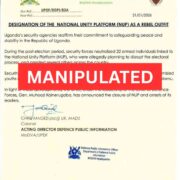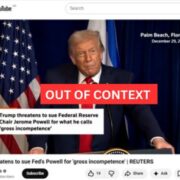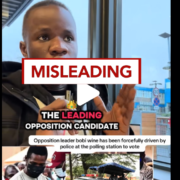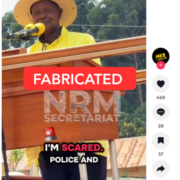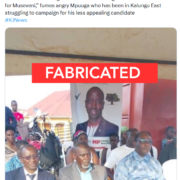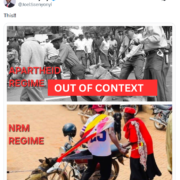FALSE: UK Parliament Did not Ditch Kyagulanyi to Endorse Ssenyonyi as Potential Ugandan President for 2026 Elections
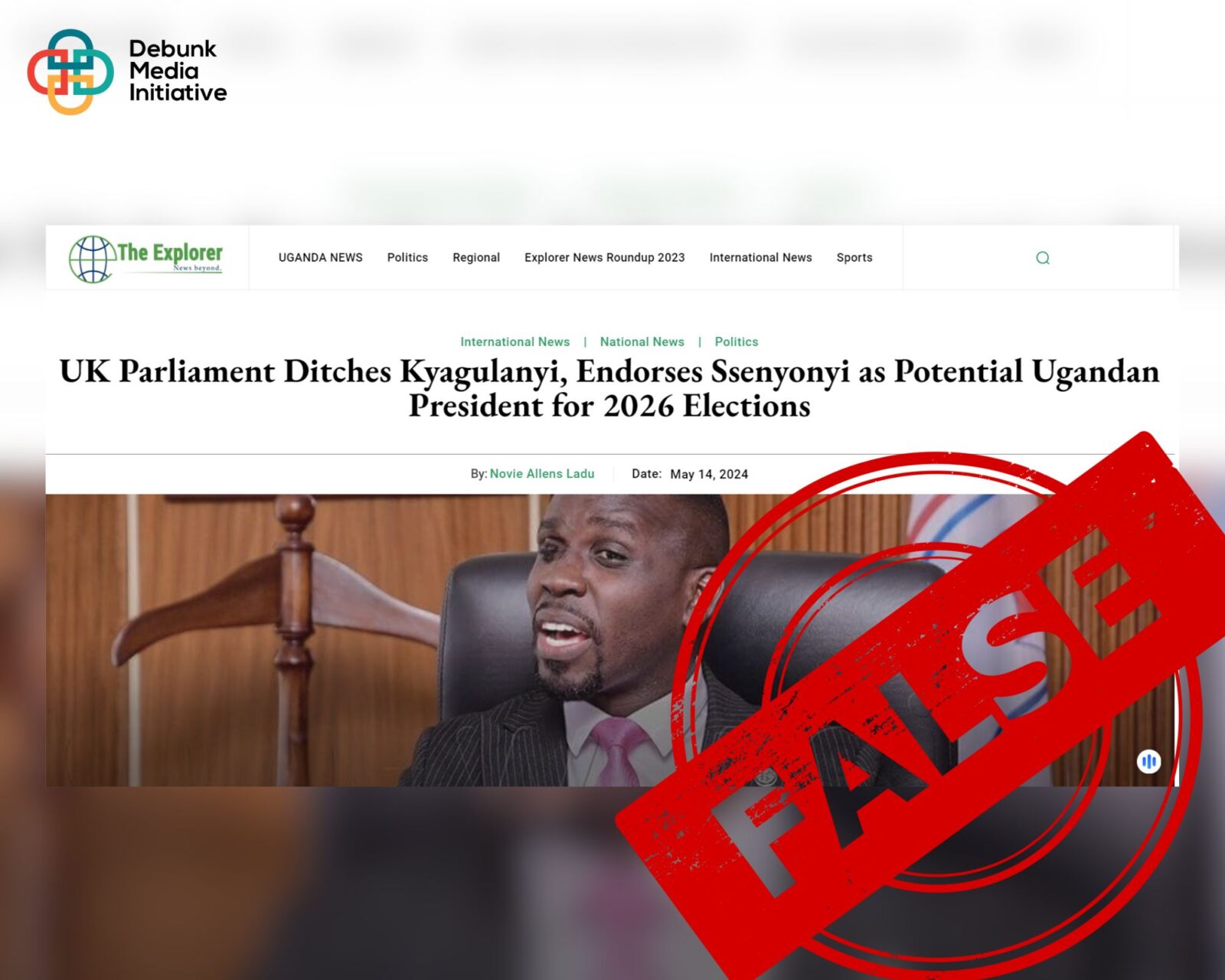
A story run by The Explorer, a local news website in Uganda headlined “UK Parliament Ditches Kyagulanyi and Endorses Ssenyonyi as Potential Ugandan President for 2026 Elections”, is FALSE.
The story was published on May 14, 2024, and claimed that the United Kingdom Parliament rejected Robert Kyagulanyi the president of the National Unity Platform (NUP) a political party in Uganda, in favour of Joel Ssenyonyi Uganda’s Leader of Opposition in parliament for the next presidential elections.
“The United Kingdom (UK) Parliament has withdrawn its support for Robert Kyagulanyi, popularly known as Bobi Wine, and instead declared Joel Ssenyonyi as its preferred candidate for the upcoming 2026 presidential general elections in Uganda,” reads the first paragraph of the story.
The Evidence:
Reading through the story, there’s not a single real source, except it vaguely refers to posts shared on Twitter/X by what the author called “Ugandans on X” in paragraph eight showing how Ugandans are concerned about the endorsement.
“Colonialism again; I thought Uganda was a sovereign… expressed one of the Ugandans on X”, according to the story.
The image shows Ssenyonyi as one-eyed, with a disabled second eye. While we acknowledge that the image used seems to be of Joel Ssenyonyi, we have not known him to have an eye defect so a quick search on the internet is done and the results show a person with two eyes.
A reverse image search on Google brings us to that exact picture published on March 15, 2024, by Bukedde’s online publication under Vision Group. The image was taken from a press conference he held in his office, and contained a New Vision watermark. Ssenyonyi’s eyes on the press conference day were just fine judging by the New Vision image that The Explorer manipulated.
The Explorer website whose slogan is “News Beyond” did not credit New Vision on the image as the guidelines of ethical journalism, but simply altered it.
Analysing the story
The website built its story on a televised parliamentary session, which they refer to in paragraph two. Still, the writer did not link the video to make the story more credible to the readers.
“During a televised parliamentary session, one of the UK’s Ministers expressed the belief that Ssenyonyi, the current leader of the opposition and a prominent figure in the National Unity Platform (NUP) party, is the most suitable candidate to lead Uganda,” read paragraph two of the story.
We landed on a trending video of the referred to parliamentary session and noticed that it had an X watermark and next to it was the name Hillary Talyor VI so we searched for the name Hillary Talyor VI on X formerly known as Twitter and we went to the media of his account we were able to trace that video and found it here and here and also found a transcribed speech of the parliament session here. There is a misrepresentation of what was said during that particular session. However, in the video, there is nowhere Lord Henry Campbell Belligham Lord Henry Campbell Belligham criticised Kyagulanyi as stated in the story.
According to paragraph three of the story, “The minister commended Ssenyonyi’s impressive educational background, exceptional oratory skills, extensive knowledge, and composed demeanour. In contrast, they criticised Kyagulanyi for speaking out of context and lacking understanding in governance, democracy, foreign policy, and fiscal matters.”
In the video, the UK parliament was discussing Uganda’s Anti-Homosexuality Act and the other speakers were suggesting harsh measures against Uganda for passing the law. Lord Bellingham suggested that their concerns would be addressed if there was a change of regime in Uganda.
“My Lords, will the Minister not agree that one thing that could make a really big difference to this appalling situation would be a change in regime and free and fair elections? He will have noted that the European Parliament concluded that the last elections were neither free nor fair and were violent. What more can we do to ensure there is a multi-party democracy? Will he find time to meet the outstanding new leader of the opposition, Joel Ssenyonyi, who is a brave young politician who deserves our support?” Lord Bellingham asked the House of Lords on May 8, 2024, during the parliamentary session in the video.
Upon analysing the videos and text, we realised the session happened because the lords were concerned about the Ugandan Anti-Homosexuality Act. Lord Bellingham noted that the thing that could put to rest their concerns about Homosexuals not having proper medical care, facing 20 years in jail and a death sentence, if found guilty, could be solved by a new regime hence asking them to support the LOP Ssenyonyi however, nobody else seconded him.
We saw no moment to vote in favour of Joel Ssenyoni or against Robert Kyagulanyi but continued discussions on the order paper. This proves that the UK parliament did not endorse anyone for the next elections at least not yet.
On cross-checking with other media on the same topic, we found an article by Chimpreports another prominent online media platform. Contrary to what The Explorer published, Chimpreports did not report that the UK parliament was endorsing Ssenyonyi for the presidency in the 2026 elections.
The author capitalised on Lord Bellingham as an influential politician when reporting the story for having brought up Ssenyonyi’s name, but underscored more on the Anti-Homosexuality Act debate at the UK parliament.
Verdict:
FALSE, while it is true that Joel Ssenyonyi’s name came up during the recent UK parliament sitting as they discussed their position on the Anti-Homosexuality Act of Uganda and seeing a change in the regime as one of the solutions to “oppressive laws”, there was no endorsement per se on who should be NUP presidential candidate in the 2026 elections, so disregard the contents of this story.
Edited by Rukia Nabbanja
This fact-check post was produced by Debunk Media Initiative under the African Fact-Checking Incubator program, with support from PesaCheck, Code for Africa’s fact-checking initiative, and the African Fact-Checking Alliance (AFCA).

